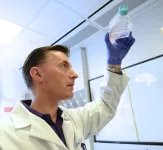(Press-News.org)
SCOTTSDALE, Ariz. — April 7, 2023 — A trio of premier Southwest biomedical research centers — HonorHealth Research Institute, City of Hope and the Translational Genomics Research Institute (TGen), part of City of Hope — have developed a more precise method that may help determine when it is best to surgically remove of pancreatic cancer tumors.
Surgical removal of the tumor can be a key step in helping extend the survival of patients with pancreatic cancer, one of the most aggressive and deadly of all malignancies and the nation’s third leading cause of cancer-related death. Currently, surgery — or surgery plus chemotherapy — are the only curative treatments for pancreatic cancer.
Because of the intricate web of critical organs and major arteries and veins surrounding the pancreas, located just below the stomach, surgery involving the pancreas is very challenging.
To take some of the guess work out of when it is safer, and more effective, to surgically remove pancreas tumors, the three research centers developed a precision method of scoring tumors based on an innovative 3D imaging technology developed by City of Hope, according to the findings of a clinical trial study published March 29 in the scientific journal Frontiers in Imaging.
“The major problem with pancreatic cancer, even what looks like localized cancer that has not spread to other parts of the body, is that you are dealing with a systemic disease right from the beginning,” said Dr. Erkut Borazanci, director of the Cancer Research Division at HonorHealth Research Institute and the senior author of the study.
“In each case, we must consider if we are making the right decision to proceed with surgery,” said Dr. Borazanci, who supervised the care of the 22 HonorHealth pancreatic cancer patients in the clinical trial.
Ranking patients for surgical candidacy
Using the 3D technology, each patient was scanned initially and scored on a range of R1-R10 to see if they qualified for surgery. Those ranked R1-R5 were eligible for surgery, and those ranked R6-R10 were not.
Patients were placed on a four-drug therapy of paricalcitol, paclitaxel, cisplatin and gemcitabine, a treatment regimen for pancreatic cancer pioneered by TGen and HonorHealth. Each patient was scanned again at 2-month intervals to see if the therapy caused their tumors to lose blood supply and shrink.
“After administration of the neoadjuvant (before surgery) therapy, 81% of patients (18 of 22) received an R score of 5 or less, deeming all of them eligible for surgery,” the study said.
Dr. Syed Rahmanuddin, who heads the 3D Oncologic Imaging Center at the Department of Radiology, City of Hope National Medical Center, one of the nation’s largest cancer research and treatment organizations, led the development of the 3D scanning analysis and the new scoring method for assessing candidacy for pancreatic cancer surgery.
His innovative 3D scanning method can determine the volume of the tumor and the number of blood vessels feeding the tumor.
Larger study needed to validate scoring system
Because of the limited number of patients analyzed in this initial study, Dr. Rahmanuddin said, the research team is already planning a larger study to validate the scoring system, establish a unique protocol for its practice, and perhaps have it adopted by the FDA.
“We are moving forward with plans to recruit 200 patients to validate this scoring process and establish it as the standard of care for treatment of patients with pancreatic cancer treatment,” said Dr. Rahmanuddin, the study’s lead author.
Dr. Daniel Von Hoff, a Distinguished Professor at TGen and the Virginia G. Piper Chair for Innovative Cancer Research at HonorHealth Research Institute, is one of the nation’s leading experts in treating pancreatic cancer patients. Dr. Von Hoff brought together Drs. Borazanci and Rahmanuddin to merge their expertise and run the study.
“Pancreatic cancer is such a difficult disease. It is incumbent on us to search for every possible advantage to benefit these patients. Progress is often dependent on bringing together the best researchers to collaborate on the most promising and innovative research,” said Dr. Von Hoff, who also authored the study. “The next, larger study we have planned will provide a unique approach for surgeons and medical oncologists to assess disease status and surgical candidacy.”
More than 64,000 Americans will be diagnosed this year with pancreatic cancer, resulting in more than 50,000 deaths. Because of the aggressive nature of this cancer, the 5-year survival rate is less than 12%.
This study was funded by The Kemper and Ethel Marley Foundation.
END
Philadelphia, April 7, 2022—A regulatory class of human T cells descends from two different origins, one that relates to autoimmunity and one that relates to protective immunity, according to a new study led by Children’s Hospital of Philadelphia (CHOP). The findings, published today in Science Immunology, could pave the way for new treatments for autoimmune diseases that target the immune system selectively.
“When it comes to autoimmunity, the prevailing wisdom has been that the only way to stop inflammation ...
Researchers have spotted how specific proteins within the chromosomes of roundworms enable their offspring to produce specialized cells generations later, a startling finding that upends classical thinking that hereditary information for cell differentiation is mostly ingrained within DNA and other genetic factors.
The Johns Hopkins University team reports for the first time the mechanisms by which a protein known as histone H3 controls when and how worm embryos produce both highly specific cells and pluripotent cells, cells that can turn certain genes on ...
A team of scientists at the Medical University of South Carolina (MUSC) has identified a stress-regulated gene that plays a role in the link between long-term stress and a common type of depressive behavior in mice. Specifically, this gene was needed for long-term stress to produce a loss of interest in activities that were once rewarding or pleasurable – often called anhedonia. However, the gene did not play a role in other common depressive-like symptoms, such as social avoidance and increased anxiety-like behavior. The team reported its findings recently in eLife.
The study was led by neuroscientists Makoto Taniguchi, Ph.D., and Christopher Cowan, Ph.D., and also ...
Common wisdom suggests that a core difference between solitude and loneliness is choice. Whereas a person who appreciates solitude might choose to enjoy a quiet night in or a solo trip abroad, a lonely person may feel disconnected from other people even in a crowded room. New research published in Psychological Science supports this notion, suggesting that lonely people may think differently regardless of the size of their social networks.
“We found that lonely individuals are exceptionally dissimilar to their peers in the way that they process the world around them … ...
Context and Background
Teaching has historically been a licensed profession in which a limited number of schools of education were typically housed in universities and offered a traditional path to certification (Kleiner, 2000). However, 30 years of documented teacher shortages in the United States resulted in federal and state policies that reduce barriers to teacher licensure (Cross, 2017). The goal of these policies is to create a larger pool of new teachers in less time than it typically takes schools of education to produce ...
RIVERSIDE, Calif. -- Inflammatory bowel disease, or IBD, describes Crohn’s disease and ulcerative colitis, two chronic diseases that cause inflammation in the intestines. IBD, which affects about 3 million adults in the United States, is an autoimmune disorder — a condition in which the body’s immune system attacks healthy tissues. Its symptoms include diarrhea, rectal bleeding, fatigue, weight loss, and stomach cramps.
The intestinal epithelium, made up of a layer of cells that lines the intestine, plays an important role in IBD because it can be easily disrupted during gut inflammation. A specialized ...
Alagille syndrome, a genetic disease estimated to affect 1 in 30,000 individuals, is caused by mutations in the gene JAG1 in most cases. The mutations affect multiple organs including the liver where it often results in cholestasis, a condition in which the flow of bile from the liver stops or slows, leading to bile buildup that in time causes liver damage. Current treatments focus on delaying disease progression; the only cure for liver disease in Alagille syndrome is liver transplantation.
Researchers at Baylor College of Medicine and collaborating institutions have discovered a strategy that prevents liver damage in animal ...
Acute myeloid leukemia (AML) is an aggressive blood cancer that causes uncontrolled accumulation of white blood cells. Because of the poor outcomes of this disease, researchers across the globe have been on the hunt for new ways to treat AML, while preserving normal blood development.
Researchers at Baylor College of Medicine and collaborating institutions report in the journal Cancer Research a new vulnerability of this cancer that can be targeted with a class of experimental drugs. These drugs target a protein complex called SWI/SNF, which many cells use to make DNA more open and accessible. ...
East Hanover, NJ – April, 7 2023 – People with disabilities maintained their record labor force participation rate in March, continuing to outperform people without disabilities, according to today’s National Trends in Disability Employment – semi-monthly update (nTIDE), issued by Kessler Foundation and the University of New Hampshire’s Institute on Disability (UNH-IOD). Year-to-year, people with and without disabilities showed gains in employment, reflecting the economy’s ongoing recovery from the effects of the COVID-19 ...
A team led by researchers at Weill Cornell Medicine, the University of Wisconsin-Madison; Scripps Research and the University of Chicago has identified an antibody that appears to block infection by all dominant variants of the virus that causes COVID-19, including Omicron, the most recent. Their discovery could lead to more potent vaccines and new antibody-based treatments.
In a study published March 6 in the Journal of Clinical Investigation, senior author Dr. Patrick Wilson, the Anne E. Dyson Professor of Pediatric Research and a member of the Gale and Ira ...



